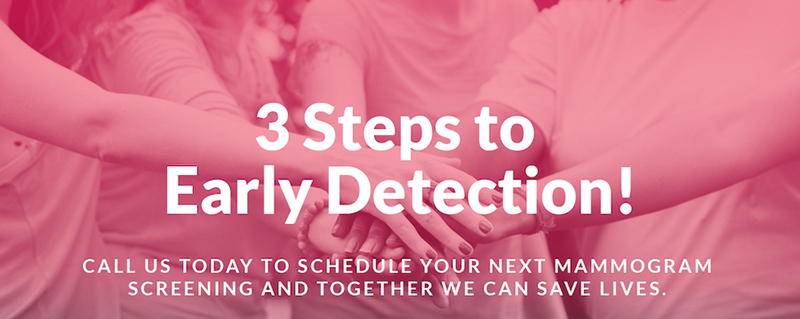October is Breast Cancer Awareness Month.
As many may not know, one in eight women in the United States will be diagnosed with breast cancer in her lifetime. This topic has an impact so many of our patients, we want to shed some light on early detection and what should you do to help take proper precautions.
3 Steps to Early Detection!
When breast cancer is detected early, it can be treated more successfully increasing your chances for survival.
According to the National Breast Cancer Foundation, there are 3 Steps to Early Detection you can take to be proactive about your breast health and help increase your chances of detecting breast cancer early.
Q. What should I look for if I examine my own breast?
Q. When should I see my doctor?
Q. When and how often should I get a mammogram?
A. BREAST SELF-AWARENESS
Can help you become familiar with how your breasts normally look and feel. Knowing this will help you identify any changes in your breasts that should be reported to your health care professional promptly. If you find a lump, schedule an appointment with your doctor, but don’t panic – most lumps are not cancer.
Changes to look for include:
• A lump or thickening in or near the breast or in the underarm area
• A change in the size or shape of the breast
• Dimpling or puckering in the skin of the breast
• A nipple turned inward into the breast
• Discharge (fluid) from the nipple
• Scaly, red, or swollen skin on the breast, nipple, or areola (the dark area of skin at the center of the breast)
You should see your health care provider about any of these symptoms. Often these symptoms are not due to cancer, but if you notice any changes in your body, tell your health care provider immediately so that the problems can be diagnosed and treated.
A. WELL-WOMAN EXAM
It is recommended that women visit their family physician or gynecologist each year for a Well-Woman Exam. In addition to a routine pelvic exam and pap smear, the doctor may perform a brief breast exam to check for abnormalities. The Well-Woman Exam is a great opportunity for you to discuss with your health care provider any questions or concerns you have regarding your breast health.
A. MAMMOGRAM
In its early stages, breast cancer doesn’t usually cause symptoms. NBCF recommends that women ages 40 and older get a mammogram every year. Although if your family has a history of breast cancer or other forms of cancer It is highly recommended to see your doctor on getting a mammogram at a younger age as well as genetic testing to determine your own risk of cancer. A mammogram is an X-ray of the breast. It is a safe way to detect cancerous tumors and other abnormal breast conditions, and women who have screening mammograms have a lower chance of dying from breast cancer than women who do not have screening mammograms. Mammograms can detect cancer or other problems before a lump becomes large enough to be detected by touch. They provide an effective way to find breast cancer in its early stages when treatment is usually the most successful. Mammograms are considered safe, quick, and relatively painless.
Have you scheduled your annual check-up? Our staff is available to address any questions you may have about your health. Call us at (210) 951-9495 to set an appointment or to speak to one of our skilled. Visit our website at satxobgyn.com for more information.
